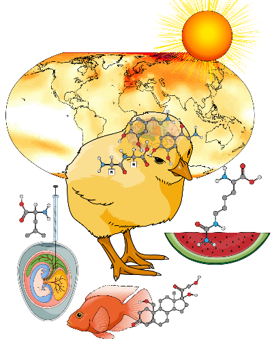研究室紹介
Animal Nutritional Physiology
Nutritional and Neuroscience Physiological approach to mitigate heat stress
Heat stress associated with global warming is a rising global concern for the wellbeing of animals and living creatures. The aim of our lab is to find out novel nutrients and biomolecules to minimize heat stress in birds and fishes.

Research Interests
Between 2002 and 2022, the amount of CO2 in Earth’s atmosphere (i.e., 8–12 km above ground level) has risen from 365 parts per million (ppm) to over 400 ppm. This increase has resulted in global warming, with the atmosphere being up to 1.5°C hotter than pre-industrial levels (IPCC, AR6, Hennessy et al., 2022). The high ambient temperature (HT) induced by global warming is leading to chickens and other organisms experiencing heat stress. Poultry and fish farmers in tropical and subtropical regions in particular are facing serious problems in this regard because heat stress has negative effects on poultry and fish production. Therefore, the current focus of this lab is to discover novel nutrients and bio-active molecules that act to alleviate heat stress through basic and applied research. We administer nutrients and neuropeptides into embryos, chickens, and goldfish to control stress response for developing a sustainable society under HT.












 Contact
Contact
 Access Map
Access Map

